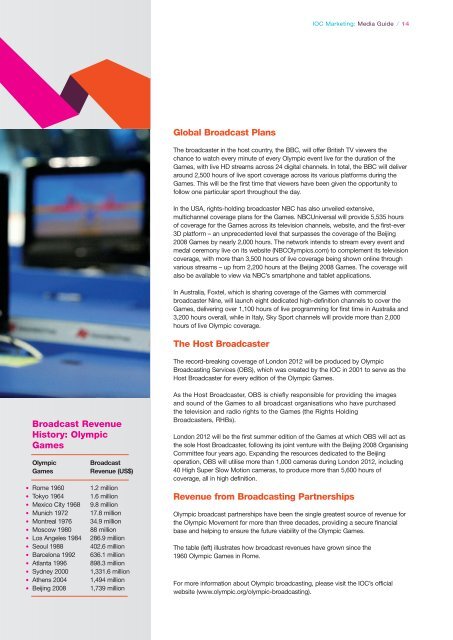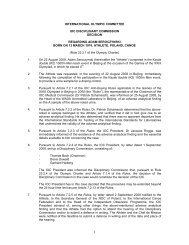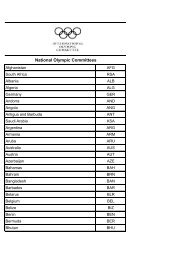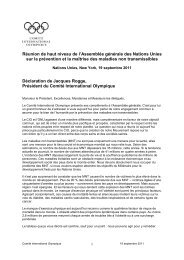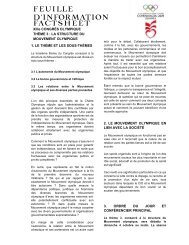IOC Marketing: Media Guide - International Olympic Committee
IOC Marketing: Media Guide - International Olympic Committee
IOC Marketing: Media Guide - International Olympic Committee
You also want an ePaper? Increase the reach of your titles
YUMPU automatically turns print PDFs into web optimized ePapers that Google loves.
Broadcast Revenue<br />
History: <strong>Olympic</strong><br />
Games<br />
<strong>Olympic</strong> Broadcast<br />
Games Revenue (US$)<br />
l Rome 1960 1.2 million<br />
l Tokyo 1964 1.6 million<br />
l Mexico City 1968 9.8 million<br />
l Munich 1972 17.8 million<br />
l Montreal 1976 34.9 million<br />
l Moscow 1980 88 million<br />
l Los Angeles 1984 286.9 million<br />
l Seoul 1988 402.6 million<br />
l Barcelona 1992 636.1 million<br />
l Atlanta 1996 898.3 million<br />
l Sydney 2000 1,331.6 million<br />
l Athens 2004 1,494 million<br />
l Beijing 2008 1,739 million<br />
Global Broadcast Plans<br />
<strong>IOC</strong> <strong>Marketing</strong>: <strong>Media</strong> <strong>Guide</strong> / 14<br />
The broadcaster in the host country, the BBC, will offer British TV viewers the<br />
chance to watch every minute of every <strong>Olympic</strong> event live for the duration of the<br />
Games, with live HD streams across 24 digital channels. In total, the BBC will deliver<br />
around 2,500 hours of live sport coverage across its various platforms during the<br />
Games. This will be the first time that viewers have been given the opportunity to<br />
follow one particular sport throughout the day.<br />
In the USA, rights-holding broadcaster NBC has also unveiled extensive,<br />
multichannel coverage plans for the Games. NBCUniversal will provide 5,535 hours<br />
of coverage for the Games across its television channels, website, and the first-ever<br />
3D platform – an unprecedented level that surpasses the coverage of the Beijing<br />
2008 Games by nearly 2,000 hours. The network intends to stream every event and<br />
medal ceremony live on its website (NBC<strong>Olympic</strong>s.com) to complement its television<br />
coverage, with more than 3,500 hours of live coverage being shown online through<br />
various streams – up from 2,200 hours at the Beijing 2008 Games. The coverage will<br />
also be available to view via NBC’s smartphone and tablet applications.<br />
In Australia, Foxtel, which is sharing coverage of the Games with commercial<br />
broadcaster Nine, will launch eight dedicated high-definition channels to cover the<br />
Games, delivering over 1,100 hours of live programming for first time in Australia and<br />
3,200 hours overall, while in Italy, Sky Sport channels will provide more than 2,000<br />
hours of live <strong>Olympic</strong> coverage.<br />
The Host Broadcaster<br />
The record-breaking coverage of London 2012 will be produced by <strong>Olympic</strong><br />
Broadcasting Services (OBS), which was created by the <strong>IOC</strong> in 2001 to serve as the<br />
Host Broadcaster for every edition of the <strong>Olympic</strong> Games.<br />
As the Host Broadcaster, OBS is chiefly responsible for providing the images<br />
and sound of the Games to all broadcast organisations who have purchased<br />
the television and radio rights to the Games (the Rights Holding<br />
Broadcasters, RHBs).<br />
London 2012 will be the first summer edition of the Games at which OBS will act as<br />
the sole Host Broadcaster, following its joint venture with the Beijing 2008 Organising<br />
<strong>Committee</strong> four years ago. Expanding the resources dedicated to the Beijing<br />
operation, OBS will utilise more than 1,000 cameras during London 2012, including<br />
40 High Super Slow Motion cameras, to produce more than 5,600 hours of<br />
coverage, all in high definition.<br />
Revenue from Broadcasting Partnerships<br />
<strong>Olympic</strong> broadcast partnerships have been the single greatest source of revenue for<br />
the <strong>Olympic</strong> Movement for more than three decades, providing a secure financial<br />
base and helping to ensure the future viability of the <strong>Olympic</strong> Games.<br />
The table (left) illustrates how broadcast revenues have grown since the<br />
1960 <strong>Olympic</strong> Games in Rome.<br />
For more information about <strong>Olympic</strong> broadcasting, please visit the <strong>IOC</strong>’s official<br />
website (www.olympic.org/olympic-broadcasting).


